The Never-Ending Itch

By Dr Duncan Houston, Veterinarian and Pet Nutritionist
Imagine you have a mosquito bite… feels sooo good when you scratch it, right? Now picture yourself covered in mosquito bites. That's what an allergy feels like to our pets. So, let's learn how to fix it and stop them from scratching.
But how can we tell between a good ol' scratch and allergies?
Ask yourself these questions:
- Do they scratch themselves continuously throughout the day and night? Are they preoccupied with scratching rather than having fun?
- Do they try to find places around the house to scratch on? Rugs, chairs, etc.
- Do they bite, lick and chew at their paws?
- Do they have paws with brown/red stained fur?
- Do they have itchy red ears with crusty skin and wax? Have a sniff too… does it smell a bit like a bakery?
- Does their tummy skin look red? Sometimes it doesn't look like nice smooth skin but a bit rough and dry. In severe cases, their bum hole can be enlarged with thickened skin and irritated. They can also have red spots called folliculitis and impetigo (mainly puppies), greasy and dandruffy skin called seborrhoea, darkened skin (increased pigmentation due to inflammation).
- Does their skin have raised bumps that look like hives?
- Is their face swollen/red or pink coloured/have pustules like big pimples under their chin and around their mouth?
- Do they have areas of fur loss and dry, dandruffy skin?
- Do they get regular hot spots? These are rashes that turn into open skin wounds that can become infected. The best way to describe these is they look like patches where the skin has been burnt.
- Are they itchy all year or worse at certain times of the year, especially in Spring and Summer?
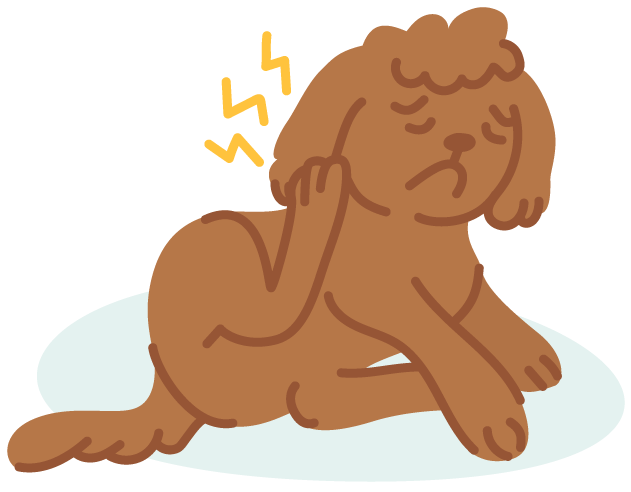
I know dogs love to scratch, and many of these can be just your dog having fun, but how do we know if it's an allergy? Several things can cause skin irritations, such as parasites, bacteria, and fungi, so when do we start to think about food and environmental factors?
If you've answered yes to one or more of the questions above, the best thing to do is get good videos and pictures of them scratching. When their skin gets bad, go to your vet, but just be warned, your regular vet may refer you to a dermatologist if they think it needs specific attention.
How is it treated?
Depending on how bad their skin is, the usual steps are as follows:

Switch to a natural, high-protein diet if they are on a high carbohydrate and preservative diet. I also recommend that you add in a sprinkle of probiotics. The more variance in bacteria within the gut, the BETTER; as with human research, the more species of gut bacteria you have, the more variable your microbiome, and the stronger your immune system is.

Switch to a single protein diet/elimination diet for 8 to 12 weeks. This is a diet where the animal in question can ONLY have one protein source for 8 to 12 weeks. Protein source means one type of meat/animal protein. I tend to recommend Salmon as my first choice if they have never had this before because of the omega 3's. It should be a novel protein source, like kangaroo, goat or turkey. I recommend that you avoid common proteins in pet food like chicken, beef or lamb.

Natural treatments are a growing area of expertise in the veterinary industry and can be a nice addition to treatment. These can include acupuncture, essential oils, fish and krill oil supplements, probiotics, massage and relaxation techniques, etc. There are quite a few options with this, so looking for a natural veterinary care professional in your area is a good idea.
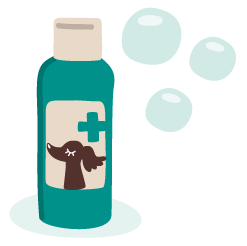
Medicated shampoos can also be good to use when the itch gets bad, but I wouldn't rely on these to fix long-term things. Some are great as they have antibacterial and antifungal agents to help control infections from bacteria and fungus, but we still need to try and solve why this itchy skin started in the first place. Ideally, you are only washing them to treat the infections. If you are using medicated shampoos long term, then only once or twice per week, although I really prefer them to secrete their natural skin oils throughout their fur rather than wash them often as sometimes it can do more harm than good. So, if you are washing several times per week, then move on to the next step here… only use these shampoos as needed, in my professional opinion.
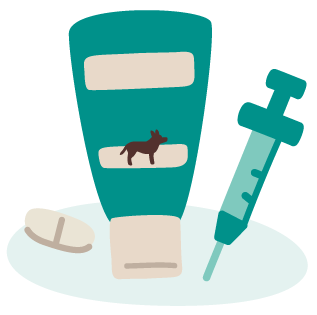
If these didn't work, then we're looking at medications to try and control things. I usually start with a 2-week course of Apoquel and see if that makes a difference, this would be taking this medication twice per day for 2 weeks. Otherwise, if tabletting is not an option, then I would use Cytopoint, which is an injectable version that lasts 4 to 8 weeks. They are slightly different, but if tabletting isn't an option or inconvenient, then this is your next option.
If the skin is infected with bacteria or fungus, such as yeast or potentially ringworm, then medications like antibiotics, antifungals and steroid creams need to be used. Mostly these are caused by trauma from constant licking and scratching by your pet, then environmental factors and pathogens take hold of the opportunity to jump into the wounds and have a party. Steroid creams can be used to calm down the infected site as they calm down the immune system and also usually contain a topical anaesthetic, like lignocaine, which will numb the area for a few hours. The most common topical treatment to use is a product called Neocort.

If these don't work, then I would suggest going and seeing a dermatologist. You can use corticosteroids to control the issue, like prednisolone, but I honestly do not like using these medications unless absolutely necessary as they have many side effects. Apoquel and Cytopoint are newer medications and safe to use with little to no side effects. They are more expensive, but my goal is always to make your pet as comfortable as possible whilst also thinking about their long-term health and prosperity.
Allergen-Specific Immunotherapy
In summary, this is where your pet gets a tiny dose of what they’re allergic to over time. These can be injections or oral medications.
Steroids
Steroids don't have to be prescribed by a dermatologist, but I prefer to know exactly what your pet is allergic to before the dermatologist decides how much and how often to use these if needed. I prefer to use them in small doses and not very often in conjunction with other medications, so the risk of side effects is greatly reduced.
Atopica
This is an immunosuppressant and, again, has side effects to watch out for. The same as what I said for steroids, it is best to see a dermatologist and work out what the allergen is, then decide on how little of this medication to use over time.
What are some Common Skin Allergies?
Common things occur commonly… investigate with your vet as to why these occurred and get to the bottom of the itchy problem.

Food Allergies and Intolerances
What's the difference between an allergy and an intolerance? Most dietary issues are actually intolerances rather than allergies. These will present as more gastrointestinal signs such as diarrhoea, vomiting, abdominal discomfort and behavioural changes such as aggression because they just feel horrible. Food allergies will present as pustules under the chin, red/pink inflamed skin, skin irritation, licking of paws and staining of fur as well as the signs above of vomiting, diarrhoea, abdominal discomfort and behavioural changes. It's best to try and notice if it happens with a certain type of food, whether it be meat, vegetable or a preservative.
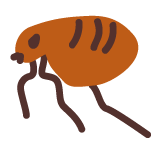
Flea Allergy Dermatitis
This occurs due to an overreaction of the animal's immune system to the saliva of a flea… yes fleas produce saliva! They salivate over animal blood… they're the little vampires of the animal kingdom. It results in a hypersensitivity reaction and can be due to just one single flea biting them. It can cause sensitivity over the top of their tail base and loss of fur in that region, but this doesn't always occur. I have seen some animals suddenly become aggressive with this reaction as well.
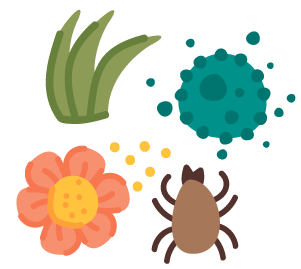
Atopic Dermatitis
(Contact (Eg. Grass), Pollen, Mould, Mite and Spore Allergies)
This is from anything that can touch your pet physically… whether microscopic or not. Common ones include:
Contact Allergies - These are from, as you guessed it, your pet coming into CONTACT with something. This can be just from any household products, whether it be fragrances, cleaning products, creams, fertilisers, etc. Watch what they touch! The most common though are: GRASS, MOULD and ENVIRONMENTAL SOURCES, such as pollen.
Dust Mite Allergies - Dust mites love to chow down on dead skin… they must love the podiatrist, I reckon. They hang around mostly during summer so best to keep your house as clean as possible to avoid these little critters.
Common Breeds?
Just as a quick sum up I thought I would just add in a few breeds I see with allergies… a lot:
• Staffies
• Frenchies
• Bulldogs (all types)
• …Oodles and white animals.
Honestly, these are probably the most common household breeds, which is probably why I see the most with allergies.
So, let's stop that itch because it can be an absolute B$@!ch…
About the Author - Dr Duncan Houston, Veterinarian and Pet Nutritionist

Duncan is a Veterinarian and pet nutrition expert based in Sydney who works mainly as a mobile vet, but also in emergency and general practice. He has a passion for aquatics and nutrition, working with several natural pet food companies for over half a decade.
Triathlon and cycling were integral parts of Duncan’s life where he competed in several different countries taking home numerous achievements. He has always been active and maintains a healthy and exercise induced lifestyle, which he projects onto the animals he treats.
Duncan hopes he can provide you with up to date research and make it relevant to your pets at home. Better to be healthy now and get things right, such as nutrition early, as prevention is always better than cure.
